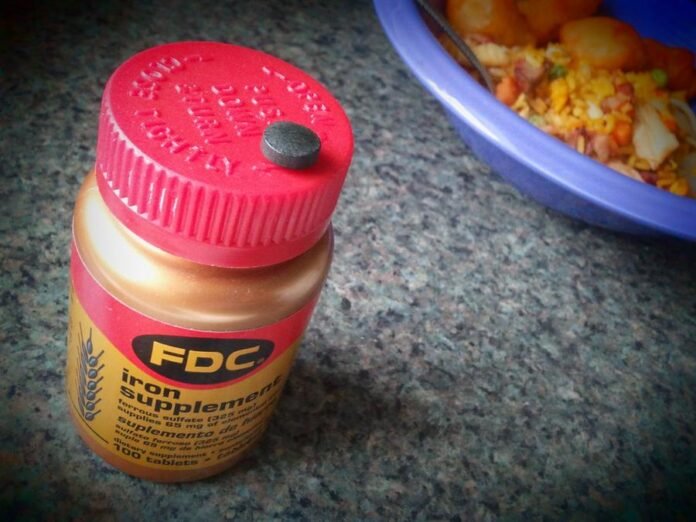Have you ever wondered what key nutrients your body needs to maintain healthy blood, muscles and brain function? It’s a mineral that often gets overlooked but is essential for overall wellness. Many people may not realize the importance of incorporating this nutrient into their daily supplement routine. In this blog post, we will explore the benefits of this crucial mineral and why it is vital for maintaining a healthy lifestyle. So, if you want to learn more about how to improve your health through supplementation, read on!
The Importance of Iron in Your Daily Supplement Routine
Iron is an essential mineral that plays a crucial role in several bodily functions. However, many people don’t get enough iron in their daily diets, leading to iron deficiency and associated health problems. This is where adding an iron supplement to your routine can help improve your overall wellness.
Without enough iron, the body’s production of red blood cells can decrease, leading to fatigue, weakness, and shortness of breath. Additionally, low levels of iron could affect cognitive function or immune response.
To maintain optimal health and wellness, it’s important to ensure that you’re getting adequate amounts of this vital nutrient every day. Consider speaking with your healthcare provider about incorporating an iron supplement into your daily routine for improved energy levels and overall well-being.
How Iron Helps Your Body Function Properly
Iron plays a critical role in maintaining overall health and wellness. One of the most important functions of iron in the body is to carry oxygen throughout the bloodstream. Hemoglobin, found in red blood cells, contains iron and binds with oxygen to transport it from the lungs to other tissues and organs.
In addition to its role in oxygen transport, iron also helps support immune system function, cognitive development, and energy production. Iron is necessary for the formation of myoglobin which stores oxygen in muscle tissue for use during physical activity.
Without enough iron intake, individuals may experience fatigue, weakness or difficulty concentrating due to a lack of sufficient oxygen supply to their vital organs. Women are especially at risk for low iron levels because they lose blood during menstruation.
It’s important to consume adequate amounts of this vital nutrient through diet or supplements as it can be difficult getting enough through food alone – particularly if you follow vegetarian or vegan diets that limit meat consumption which contains heme-iron known as easily absorbed form by our bodies.

Common Signs of Iron Deficiency and How to Address Them
Iron deficiency is a common issue that affects many people, especially women and children. One of the most common signs of iron deficiency is fatigue, which can make it difficult to get through the day. Other symptoms include weakness, dizziness, pale skin, and shortness of breath. If left untreated, iron deficiency can lead to anemia, a condition in which your body doesn’t have enough red blood cells to carry oxygen throughout your body.
To address iron deficiency, it’s important to increase your intake of iron-rich foods or take iron supplements. However, it’s important to talk to your doctor before starting any new supplement regimen. They can help you determine the right dosage and type of supplement for your needs. In some cases, they may also recommend additional testing to rule out any underlying health issues that could be causing your iron deficiency. With proper treatment and care, you can improve your iron levels and feel more energized and healthy overall.
Understanding the Different Types of Iron Supplements Available
One of the most important things to consider when taking an iron supplement is the type of iron it contains. Ferrous sulfate is one of the most common forms, but it can cause digestive issues such as constipation or upset stomach. If you experience these side effects, you may want to try a different form such as ferrous fumarate or ferrous gluconate, which are less likely to cause gastrointestinal problems.
It’s also important to note that not all iron supplements are created equal in terms of how much elemental iron they contain. Be sure to check the label for this information and talk with your healthcare provider about what dosage would be appropriate for you based on your individual needs and any underlying health conditions you may have.
Overall, choosing the right type and dose of iron supplement can help ensure that your body is getting adequate amounts of this essential nutrient without causing unwanted side effects.
How to Incorporate Iron into Your Diet Naturally
Iron-Rich Foods You Should Include in Your Diet
Iron-rich foods are essential for maintaining healthy iron levels in the body. Some of the best sources of iron include red meat, poultry, fish, beans, lentils, tofu, spinach, and fortified cereals. It’s important to pair these foods with sources of vitamin C to enhance iron absorption. For example, squeeze lemon juice over your spinach salad or pair your lentil soup with a side of bell peppers. Additionally, cooking with cast-iron cookware can also increase the amount of iron in your diet. By incorporating these iron-rich foods into your daily meals, you can naturally boost your iron intake and support overall health and wellness.
Simple and Delicious Recipes Packed with Iron
Looking to incorporate more iron-rich foods into your diet? Try these simple and delicious recipes that are packed with nutritious iron. Spinach and kale are great sources of iron, so try making a spinach and kale salad with grilled chicken or tofu for a filling and healthy meal. Lentils and beans are also high in iron, so try making a lentil soup or bean chili for a hearty and nutritious dinner. For breakfast, try making oatmeal with sliced almonds and dried apricots for a sweet and iron-packed start to your day. With these tasty recipes, you can easily incorporate more iron into your diet naturally.
Strategies for Vegetarians and Vegans to Boost their Iron Intake
For vegetarians and vegans, it can be challenging to get enough iron in their diets since the mineral is predominantly found in animal products. However, there are several plant-based sources of iron that can help boost your intake. Leafy greens like spinach and kale, lentils and beans, tofu, quinoa, and fortified cereals are all excellent sources of iron. It’s also important to pair these foods with vitamin C-rich options like citrus fruits or bell peppers to enhance absorption. Consider incorporating these foods into your meals to naturally increase your iron intake.
Tips on Pairing Foods to Maximize Iron Absorption
When it comes to increasing your iron intake through diet, pairing certain foods together can help maximize iron absorption. One key tip is to consume foods high in vitamin C alongside iron-rich foods such as spinach or red meat, as vitamin C enhances the body’s ability to absorb non-heme iron. Another important tip is to avoid consuming calcium-rich foods at the same time as iron-rich foods, as calcium can inhibit the absorption of both heme and non-heme forms of iron. Incorporating these simple tips into your meals can help ensure you’re getting the most out of your natural sources of iron.
Tips for Taking Iron Supplements Safely and Effectively
Iron supplements can be a great addition to your daily routine, but it’s important to take them safely and effectively. Here are some tips to keep in mind:
- Always follow the recommended dosage on the label or as directed by your healthcare provider. Taking too much iron can be harmful, especially for children.
- Take iron supplements with food to help with absorption and reduce the risk of stomach upset.
- Avoid taking iron supplements with calcium-rich foods or supplements, as calcium can interfere with iron absorption.
- Consider taking iron supplements separately from other medications, as some medications can also interfere with iron absorption.
- If you experience constipation or other digestive issues while taking iron supplements, talk to your healthcare provider about adjusting your dosage or trying a different type of supplement.
Remember that while iron supplements can be helpful for addressing deficiencies, it’s always best to try to incorporate iron-rich foods into your diet first. If you have any concerns about taking iron supplements, talk to your healthcare provider for personalized advice and guidance.
Frequently Asked Questions About Iron and Supplements
Iron supplements are a popular addition to many people’s daily routines, but there are still some questions surrounding their use. Here are some frequently asked questions about iron and supplements:
What is the recommended daily intake of iron? The recommended daily intake of iron varies depending on age and gender. Adult men and postmenopausal women need about 8 mg per day, while premenopausal women need about 18 mg per day.
Can I get too much iron from supplements? Yes, it is possible to get too much iron from supplements. Overdosing on iron can cause nausea, vomiting, and even organ damage. It’s important to follow the recommended dosage on the supplement label and talk to your doctor before starting any new supplement regimen.
What are some foods high in iron? Foods high in iron include red meat, poultry, seafood, beans, lentils, tofu, spinach, and fortified cereals.
Can iron supplements cause constipation? Yes, iron supplements can cause constipation in some people. To avoid this side effect, try taking your supplement with food or ask your doctor about alternative forms of iron that may be easier on your digestive system.
How long does it take for iron supplements to work? It can take several weeks for iron supplements to raise your body’s levels of iron. Be patient and consistent with taking your supplement as directed by your doctor.
Remember to always talk to your doctor before starting any new supplement regimen or making significant changes to your diet.
In conclusion, iron is a crucial nutrient that plays an essential role in maintaining your overall health and wellness. Incorporating iron into your daily supplement routine can help prevent iron-deficiency anemia, increase energy levels, improve brain function, and support a healthy immune system. To ensure maximum benefits from iron supplements, it’s important to take them safely and effectively while keeping in mind any potential side effects. By understanding the importance of iron and how it helps your body function properly, you can make informed decisions about incorporating this vital nutrient into your daily diet for optimal health and well-being.

